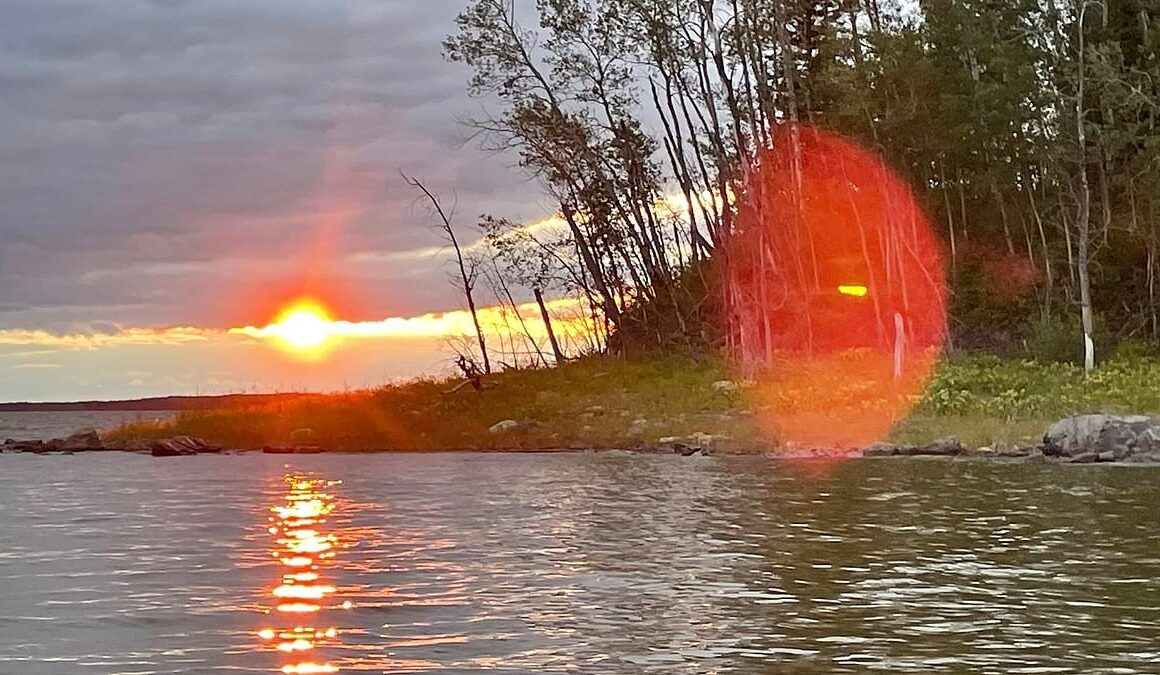For the last 20 years, the First Nation settlement of Granville Lake has been eerily quiet, with abandoned houses lining the streets.
After a sewage spill disaster sparked a mass evacuation of the settlement, only one couple remained on the peninsula in the Canadian province of Manitoba, near the Muskwanuk and Mistuhe islands.
Clarence Bighetty, 60, and his partner live on the east side of the remote Canadian town without treated water, phone service or grocery stores.
The closest regional centre where Bighetty can stock up on groceries, Leaf Rapids, is about 28 miles away from the island only accessible by boat or snowmobile, depending on the season.
But Bighetty says he loves the quiet life in his town – despite the lack of amenities.

For the last 20 years, the First Nation settlement of Granville Lake (lake pictured) has been eerily quiet, with abandoned houses lining the streets

Pictured above is a map of the peninsula Granville Lake is located on near Muskwanuk and Mistuhe islands

After a sewage spill disaster sparked a mass evacuation of the settlement, only one couple remained on the peninsula in the Canadian province of Manitoba, near the Muskwanuk and Mistuhe islands (pictured: grassy area around the settlement)
‘It’s a beautiful place we can build … very healthy and strong again’ for the younger generation, he told CBC.
The grandfather of 43 children added: ‘My elders taught me. I’ve been all over this land and all over the trails and, you know, they taught me well, and that’s why I take my knowledge and am trying to pass it on to the younger generation.’
He earns money by commercial fishing in the summer, harvests local medicine and him and his partner eat fresh produce from their self-grown outdoor garden.
While Bighetty usually has a water pump running lake water to his house, but he said it broke in mid-July and to repair it, he needs to head to Leaf Rapid for spare parts.
He can even get a satellite connection to the outside world, thanks to Manitoba Hydro providing him with electricity.
The 60-year-old told CBC that lighting was a necessity ‘so it won’t be so dark and desolate’, especially considering wild animals like bears and wolves regularly roam around the town.
Granville Lake – which has been recognized as a settlement since 1971 – was evacuated in 2003 when its septic system failed and flooded the streets and lake with sewage.
At the time, nearly 70 people were living there – now only Bighetty, his partner, their home as well as nearly a dozen abandoned houses and an unused school are left after the community’s population was 10 people when it was last tracked in 2016.
The province says the spill was caused by incompatible holding tanks and despite a new local septic system with holding tanks and pumps, a life station, a water treatment plant, a lagoon and water and sewer lines being installed, most community members stayed away.
Most of the evacuated residents settled down in 28-miles-away Leaf Rapids instead of returning to their settlement, ‘believing that the sewage spill was not remediated’, the province told CBC.

At the time, nearly 70 people were living there – now only Bighetty, his partner, their home as well as nearly a dozen abandoned houses and an unused school (pictured) are left after the community’s population was 10 people when it was last tracked in 2016

Granville Lake is a settlement on a small peninsula in central Canada (pictured above)
While Granville Lake sees some community members visiting for a few weeks or months in the summer, Bighetty and his partner are the only people who live in the remote town year-round.
One of those visitors is Beverly Baker, who is among those believing that the town was not cleaned up properly and said that ‘our tanks are still filled… they haven’t come and emptied it out’.
Her late mother used to live in one of the houses still standing in Granville.
‘This is where our history is, and we want to show our grandchildren our rich history and our rich resources here,’ she told CBC about the land being her grandchildren’s birthright.
But Baker said she never takes her children and grandchildren back to the settlement for more than two weeks, as she said the children would get ‘sores and boils’ at that point.
She said losing their homes and resettling hit the community hard. Many members lost their lives to addictions and suicide, according to Baker.
Bighetty added that people only usually return to the community when they are dead, hoping to be buried on their land. He said those deaths are drug- or alcohol-related, as well as killings and suicide.
The grandfather acknowledged that even if people wanted to come back and live in Granville Lake, it wasn’t easy due to the lack of running water and amenities like hospitals, schools and transport links – but he is still hoping to rebuild the town for his grandchildren to have a ‘place to call home’.









